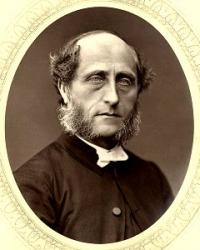
1816 - 1902 Person Name: C. Newman Hall, 1816-1901 Author of "I want to live and be a man" in The Sunday School Hymnary Hall, Christopher Newman, LL.B., son of J. Vine Hall, was born at Maidstone, May 22, 1816, and educated at Totteridge School, and Highbury College, London. In 1841 he graduated B.A. at the University of London, and LL.B. in 1856. From 1842 to 1854 he was minister of Albion Church, Hull; and from 1854 he has been in charge of Surrey Chapel, and its continuation, Christ Church, Westminster. He was also chairman of the Congregational Union of England and Wales in 1876. In addition to several prose works, and numerous tracts (one of which, "Come to Jesus," has been translated into 30 languages and has reached a circulation of two millions), he published:—
(1) Hymns composed at Bolton Abbey, and Other Rhymes, Lond., Nisbet, 1858; (2) Cloud and Sunshine, Lond., Hamilton, Adams & Co., 1870; (3) Christ Church Hymnal, for the use of the Congregation of Christ Church, Westminster Road, Lond., Nisbet, 1876; (4) Pilgrim Songs in Sunshine and Shade, Lond. 1870 (this is No. 1 with additional verses); (5) Supplemental Pilgrim Songs; and (6) Songs of Earth and Heaven, Lond., Hodder & Stoughton, 1886.
In the Christ Church Hymnal, 1876, there are 82 original hymns by Mr. Hall, 10 of which previously appeared in his Hymns composed at Bolton Abbey, &c, 1858. All the 82 hymns are signed “N. H." Of his hymns the most popular are, "Accepting, Lord, Thy gracious call"; "Friend of sinners, Lord of glory"; and "Hallelujah, joyful raise" (q.v.). In addition the following are also in common use outside of his Hymnal:—
1. Come, Lord, to earth again (1876). Advent.
2. Day again is dawning (1872). Morning.
3. Friend of sinners, hear my cry (1844). Lent.
4. God bless our dear old England (1876). National Hymn.
5. I know who makes the daisies. Providence.
6. Lord, we do not ask to know (1876). Missions.
7. O Jesus, Who to favoured friend (1876). B. V. M. given into the charge of St. John. [Rev. W. Garrett Horder]
-- John Julian, Dictionary of Hymnology
=====================
Hall, C. N., p. 481, i. Several recent hymns are included in his Lyrics of a Long Life, 1894. The additional hymns which have come into use since 1890 include:—
1. Come to Jesus! Friend of sinners. [Jesus the Saviour.] Lyrics, 1894, p. 176. Previously in Congregational Sunday School, Supplement, 1891, and School Hymns, 1891, as "Come to Jesus! Mighty Saviour."
2. I want to live and be a man. [Manliness.] Lyrics, 1894, p. 240, headed "A Boy's Hymn." A response to "I want to be an Angel" [p. 559, i.]. Previously in School Hymns, 1891, No. 334.
3. I've wandered far from home. [The Prodigal.] Pilgrim Songs, 1871, p. 17; Christian Endeavour Hymnal, 1896.
4. Lord! we obey Thy kind command. [Repentance.] Lyrics, 1894, p. 193. Previously in School Hymns, 1891, No. 137, as "Lord! I obey."
5. 0 for the love, the perfect love. [Fearless Love.] Lyrics, 1894, p. 199. Previously in School Hymns, 1891, No. 482.
6. To David's Son, Hosanna. [Hosanna to Jesus.] In Christ Church Hymnal, 1876, No. 550, the Sunday School Hymnary, 1905, &c.
Mr. Hall died Feb. 18, 1902. [Rev. James Mearns, M.A.]
--John Julian, Dictionary of Hymnology, New Supplement (1907)
Christopher Newman Hall


 My Starred Hymns
My Starred Hymns




